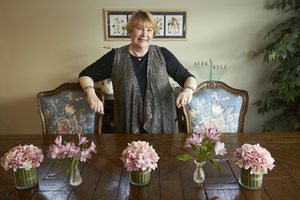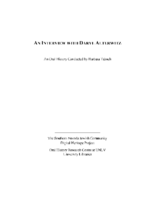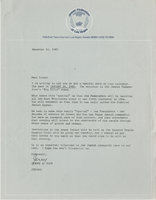Search the Special Collections and Archives Portal
Search Results
Natalie Wolf oral history interview
Identifier
Abstract
Oral history interview with Natalie Wolf conducted by Barbara Tabach on October 22, 2016 for the Southern Nevada Jewish Heritage Project. Wolf shares stories of operating the Greyhound bus station, a three-year ownership of Commercial Deli, and her long career working collections for the casino industry. She discusses working for Tropicana Hotel and Casino, and MGM Properties, including the Mirage Hotel.
Archival Collection
Mark Fine oral history interview
Identifier
Abstract
Oral history interview with Mark Fine conducted by Barbara Tabach on November 18, 2014 for the Southern Nevada Jewish Heritage Project. Fine discusses his career as a significant developer of planned communities within Green Valley and Summerlin in Henderson, Nevada. He also talks about the history of Las Vegas, Nevada since 1973.
Archival Collection
Raymonde Fiol oral history interview
Identifier
Abstract
Oral history interview with Raymonde Fiol conducted by Barbara Tabach on August 12, 2015 for the Southern Nevada Jewish Heritage Project. Fiol discusses surviving the Holocaust and moving to Las Vegas, Nevada in 2001. She also discusses her time serving as president of the Holocaust Survivors local organization since 2010, and making improvements on Holocaust education in local schools.
Archival Collection
Audio clip from interview with Rabbi Yocheved Mintz, March 11, 2015
Date
Archival Collection
Description
In this audio clip, Rabbi Mintz talks about attending a class at the Academy for Jewish Religion in California, which helped her realize a lifelong dream to become a rabbi.
Sound
Esther Toporek Finder oral history interview
Identifier
Abstract
Oral history interview with Esther Toporek Finder conducted by Barbara Tabach on June 08, 2016 and June 28, 2016 for the Southern Nevada Jewish Heritage Project. In this interview, Finder discusses her childhood and her passion for the Holocaust survivor community. She shares her experiences interviewing survivors and their descendants over the years. In addition, she reflects on her long reach within the survivor community and highlights the traveling, teaching, and community service opportunities she has had.
Archival Collection

Photograph of Barbara Raben, Henderson, Nevada, November 01, 2016
Date
Archival Collection
Description
Longtime Southern Nevada resident Barbara Raben poses in her Henderson home. Raben has been involved with the Hadassah Southern Nevada Chapter and the Jewish Family Service Agency.
Image

Transcript of interview with Mark Fine by Barbara Tabach, November 18 and December 2, 2014
Date
Archival Collection
Description
Interview with Mark Fine in two sessions, November 18 and December 2, 2014. In the first session, Fine begins by talking about his sons and their business interests, then discusses his own childhood growing up in Cleveland. Fine moved to Arizona as a teenager and attended the University of Arizona for college. After college, he moved to New York city, and describes his employment at Chemical Bank, and then at the investment firm Loeb, Rhoades. He was married and started a family in New York City, then moved to Las Vegas to assist in his in-laws' (the Greenspuns) business ventures, which included real estate development and Sun Outdoor Advertising. Fine talks about Las Vegas in the 1970s and building Green Valley and Summerlin, the "social engineering" aspects of developing a community and the importance of building incrementally. In Part II of the interview, Fine discusses his family history and raising his children in Las Vegas. He talks about the growth of the Jewish community and ph
Mark Fine was born in 1946 in Cleveland, Ohio, and was raised with a strong Jewish identity. When Mark was in fourth grade, his parents moved the family to Shaker Heights, and again moved to Arizona during his senior of high school. Upon graduation, Mark enrolled at the University of Arizona and became a member of the ZBT fraternity; determined to graduate in four years, he finished in 1964 with a degree in business administration with an emphasis in real estate. Though never having been, Mark took his degree to New York City and established a career on Wall Street, first working for Chemical Bank. In 1969, Mark married Susan Greenspun, and soon after, the couple had their first child. By this time, Mark had taken a new position with Loeb, Rhoades and Company, and worked there for nearly five years in their corporate finance department. In 1973, Mark moved to Las Vegas to assist his father-in-law, Hank Greenpun, with his nonnewspaper business operations, largely under the auspices of American Nevada Corporation. Mark soon capitalized on this passion for real estate and community development, leading several integrated real estate projects to create the Green Valley area, the city's first large-scale master-planned community. Mark went on to launch a similar project in Summerlin, and at one point, he was leading the development of the country's two fastest selling planned communities (Green Valley and Summerlin). Ultimately, Mark became one of state's prominent real estate developers, and continues to lead significant projects positively impacting the city's growth and appeal. His fundamental goal has always been to create a sense of place, to develop thriving communities with generational stamina. His success in this endeavor is recognized, in part, with the naming of Mark L. Fine Elementary School. Over the years, Mark has also been an important member of the Jewish community, among the "second generation of pioneers," coming after those heavily involved with the hotels during the 1950s and 1960s. He served on the Temple Beth Sholom board of directors, and initiated events to bring older and younger generations of the Jewish community together in meaningful ways. Mark has five children?Alyson Marmur, Katie Erhman, Jeffrey Fine and Jonathan Fine and Nicole Ruvo Falcone?and is married to Gloria Fine.
Text

Transcript of interview with Daryl Alterwitz by Barbara Tabach, November 8, 2014
Date
Archival Collection
Description
Interview transcript with Daryl Alterwitz by Barbara Tabach on November 8, 2014. In this interview Daryl Alterwitz, son of Deanne and Oscar Alterwitz, recalls moving to Las Vegas from Gary, Indiana, for his parents' pursuits in the furniture business. He speaks about his schooling at Valley High School, his friendship with Robert Engel, and attending University of California Santa Cruz, and taking a leave of absence to travel through Asia. Alterwitz became more involved in Judaism after his bar mitzvah, and has continued his religious affiliation throughout his adult life, and has traveled to Israel twice. He talks about meeting his former wife, his travels through Europe, and coming back to Las Vegas after some time in Reno.
In 1959, Daryl Alterwitz was born in Gary, Indiana, son of Oscar and Deanne Alterwitz. When he was thirteen years old, his family moved to Las Vegas to capitalize on new opportunities in the growing city, and his parents purchased Walker Furniture soon after their arrival. As a high school student, Daryl experienced a powerful trip to Israel, which strengthened his connection to Judaism. After graduation from Valley High School, Daryl attended the University of California - Santa Cruz, and after two years of study, Daryl took time off to travel throughout South Asia, accompanied by close childhood friend Robert Engel. He returned after a year and graduated with an independent major in classical studies. From there, Daryl spent more time in Israel living on a kibbutz. Daryl next went to law school at Santa Clara University, and then supplemented his education with a degree in taxation from New York University School of Law. Between law school and New York, he met his wife, Teri Shoofey; they two had two children, though are now divorced. After New York, he returned to Nevada, first living in Reno. After his father passed away, Daryl moved back to Las Vegas, and took on more responsibility with the family business as well as practicing law. Daryl?s commitment to community service is enduring and visible. He has donated his time and resources to both Jewish organizations, like Jewish Family Services, and non-Jewish groups, like Las Vegas Rescue Mission. He has also served on the boards of the Jewish Federation, Congregation Ner Tamid, and the Anti-Defamation League. Daryl also continues to indulge his passion for international travel, having visited Morocco, Egypt, Turkey, Cambodia, and has even biked from Hungary to Poland.
Text


